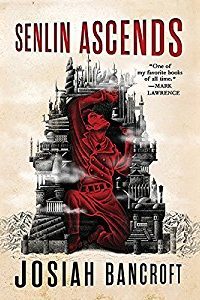Paul Di Filippo reviews Matthew De Abaitua
If Then, by Matthew De Abaitua (Angry Robot 978-0857664662, $7.99, 416pp, mass market paperback) September 2015
 Given that Matthew De Abaitua’s first novel from 2007, The Red Men, has had no USA edition, as of this writing, his second book, If Then, newly issued by Angry Robot, more or less amounts to his introduction to a large cohort of readers. And a more splendid first impression could not be delivered. This is the kind of post-apocalypse, after-it-all-changed novel—with clever codicils—that the Brits do with so much more classy, idiosyncratic style than anyone else. It is full of magisterial weirdness, logical surrealism, melancholy joy and hopeful terror. If I begin to toss out names like Adam Roberts, Brian Aldiss, Keith Roberts, and J. G. Ballard, I will not be lavishing undue praise.
Given that Matthew De Abaitua’s first novel from 2007, The Red Men, has had no USA edition, as of this writing, his second book, If Then, newly issued by Angry Robot, more or less amounts to his introduction to a large cohort of readers. And a more splendid first impression could not be delivered. This is the kind of post-apocalypse, after-it-all-changed novel—with clever codicils—that the Brits do with so much more classy, idiosyncratic style than anyone else. It is full of magisterial weirdness, logical surrealism, melancholy joy and hopeful terror. If I begin to toss out names like Adam Roberts, Brian Aldiss, Keith Roberts, and J. G. Ballard, I will not be lavishing undue praise.
The first section of our novel is titled “If,” and that contingent word being so inextricably tied up with science fiction, it feels natural for us to be in the future.
The tiny village of Lewes is a tightly managed community existing post-Seizure. The Seizure was the collapse and/or transmogrification of capitalism. “After the Seizure, most people were redundant. [Now] we are data beasts in a…zoo…” De Abaitua plays off both meanings of the word “seizure,” a spasm or fit, and a confiscation. In any case, the inhabitants of Lewes are under the authority of the Process, a kind of artificial intelligence or distributed, algorithmic governing system that delivers its orders to select enforcers via implanted wetware. The scenario will stir echoes of Jerome Bixby’s classic “It’s a Good Life.”
James, the bailiff, is one such instrument of the state. He patrols the village, maintaining order and seeing that the Process is obeyed. (Its followers or chattel do not lack free will entirely.) His major task comes with each ritual Eviction Night (picture a hybrid of Shirley Jackson and The Golden Bough), when he dons a giant dieselpunk mecha-suit and goes after the listed villagers whom the Process wishes to expel, for whatever cryptic reasons.
James’s wife is Ruth—a fully rounded narrative figure in her own right—village schoolteacher and seamstress. Both of them had high-powered, high-status careers prior to the Seizure, but are now bitterly reconciled to their lowly, feudal fate. James is more embedded in the system than Ruth, due to his special implant, and the tensions in their marriage derive from his unthinking obedience to the Process.
One further player at Lewes is the Institute: a crumbling mansion inhabited by mutant savants, including a female scientist straight out of Ballard, Alex Drown, and the misshapen ancient sage Omega John. “I have undergone forty-eight procedures. Twenty voluntary, twelve of them vindictive. Fifteen were subsequently corrective; one, performed a long time ago, was particularly traumatic. My former rivals in the Institute took puerile delight in rearranging the regions in my global workspace.” Drown clarifies: “His mind.”
James’s regular life begins to go off the rails when he encounters an android soldier named Hector. Manufactured by the Process, Hector has been introduced into the village for unknown reasons. “The soldier is an error message,” opines one citizen. This kind of gnomic utterance, so reminiscent of Ballard’s style, is a major feature of De Abaitua’s deracinated world. “Addiction is a feature, not a bug” says Dr. Drown. “Time was fermenting here, becoming an intoxicant,” thinks James at one point.
The second part of the book is, of course, labeled “Then.” Suddenly, after the last Eviction goes bad, James finds himself back during WWI, as a stretcher bearer. He has vague memories of his life in Lewes, including his love for Ruth, but the reality of the trench warfare and the imperatives of his comrades are too vital and dangerous and heartfelt to ignore. But it is in this bloody ground, we gradually learn, that the seeds of the Seizure, the Process and Lewes were first planted. This war engulfing James is a simulacrum, an augmented-reality LARP. Or is he experiencing a true timeslip incident? De Abaitua keeps us in suspense till the very end, much in the deft manner of Christopher Priest’s The Separation.
The bucolic ruins of England are evoked as searingly as those in Aldiss’s Greybeard, and the WWI milieu reads like a first-hand, classic work of that exact vintage from, say, Dos Passos or Robert Graves. But of course De Abaitua weaves his stefnal unreality throughout everything, blending an intense naturalism with estrangement.
This novel, by turns dramatic and quiet, shattering and affirming, has much to say on a variety of essential topics. What is the nature and duty of Homo economicus? Should one surrender one’s self to any higher authority, perhaps more wise than oneself? What are the ultimate stresses that love can endure and surmount? Can humanity ever be perfected or even improved? All these issues and more are objectified in brilliant storytelling carried by persons we empathetically inhabit.
It is almost as if we, the readers, are the Process, empowered by De Abaitua’s skills, and our reactions, as with any good novel, will ripple out to change reality.





